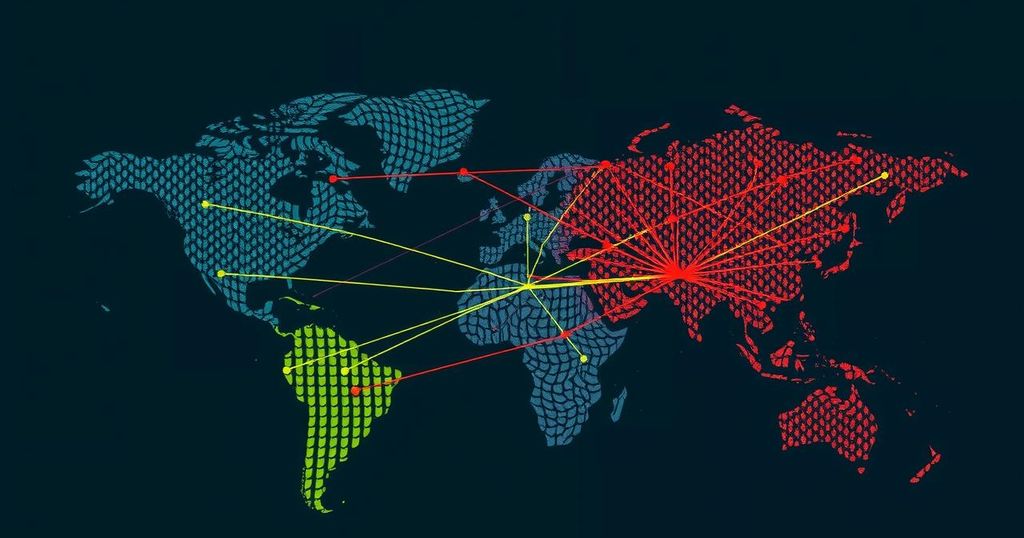The Disturbing Link Between Climate Change and Authoritarianism

This article discusses the alarming correlation between climate change and the rise of authoritarian leaders, particularly in the wake of natural disasters like Super Typhoon Yolanda. Analyzing the cases of Rodrigo Duterte in the Philippines and other global leaders, it highlights how political figures exploit societal fear and vulnerability in disaster-stricken areas to consolidate power. Studies indicate that natural disasters can diminish democratic scores, categorizing affected nations as ‘storm autocracies.’ The article emphasizes the importance of proactive collective action in safeguarding democratic values against the backdrop of mounting climate challenges.
In November 2013, the Philippines endured Super Typhoon Yolanda, one of the most powerful tropical cyclones ever recorded. The storm brought catastrophic winds and massive storm surges, resulting in a confirmed death toll of 6,300, though actual fatalities are believed to surpass this figure. During the aftermath, Rodrigo Duterte, then mayor of Davao City and a presidential candidate, seized the opportunity to bolster his political image by promising stringent measures against looters, showcasing an alarming potential for disaster situations to elevate authoritarian leaders. Duterte’s presidency from 2016 onwards reflected his contempt for democratic norms, characterized by a brutal war on drugs that resulted in thousands of extrajudicial killings, as well as the imposition of martial law in regions severely affected by both natural disasters and political unrest. Analysts assert that disasters like Yolanda create a context for these leaders to consolidate power by exploiting societal despair. The rise of other authoritarian figures globally, from Narendra Modi in India to Jair Bolsonaro in Brazil, correlates with escalating climate change challenges that provoke public fear and insecurity. As citizens confront the direct consequences of climate change, many may gravitate toward leaders who propose strong, decisive actions framed around national and economic interests. Recent studies have empirically quantified the authoritarian shift in democracies following natural disasters, identifying a causal relationship wherein storms diminish democratic frameworks. Notably, a 2022 study focusing on island nations demonstrated that electoral systems can register an average decrease in democracy scores post-disaster, thus labeling these countries as “storm autocracies.” Furthermore, psychological studies have indicated that awareness of climate risks can incite negative biases against marginalized groups, reinforcing divisiveness and conformity to dominant norms. Despite observed correlations, researchers assert caution in determining direct causality. Nevertheless, the synthesis of climate change and its psychological impacts on voters presents an urgent concern. Experts advocate for proactive engagement with the risks presented by climate change, promoting collective action rooted in social justice rather than divisive ideologies. The future of democratic values may hinge on recognizing this contemporary political climate, and responding effectively to both the environmental and sociopolitical crises at hand.
The article examines the troubling connection between climate change and the rise of authoritarian leaders worldwide, notably in the context of natural disasters exacerbated by climate-related factors. It highlights how political figures can exploit turmoil and insecurity following such events to consolidate power and undermine democratic institutions. This trend is explored through historical examples and contemporary case studies, suggesting a possible link between climate-induced crises and an increase in autocratic governance styles. The work of political scientists, economists, and psychologists is referenced to elucidate the psychological impacts of climate change on voter behavior, suggesting that fear and insecurity can lead individuals to support authoritarian figures. The discourse also looks into how responding to societal fears surrounding climate change may present an opportunity for democratic engagement and activism, urging a collective response that transcends tensions related to identity and divisiveness.
Climate change poses significant threats not only to the environment but also to the structure and stability of democratic governance globally. The correlation between natural disasters and the rise of authoritarianism requires urgent attention, as these leaders could effectively exploit societal vulnerabilities for political gain. The empirical evidence from recent studies signals a crucial need for democracies to address the emotional and psychological ramifications of climate change, while formulating strategies to mitigate the growth of autocratic powers. Ultimately, the path forward will depend on civic engagement and the resilience of democratic institutions to adapt and respond effectively.
Original Source: www.fastcompany.com







